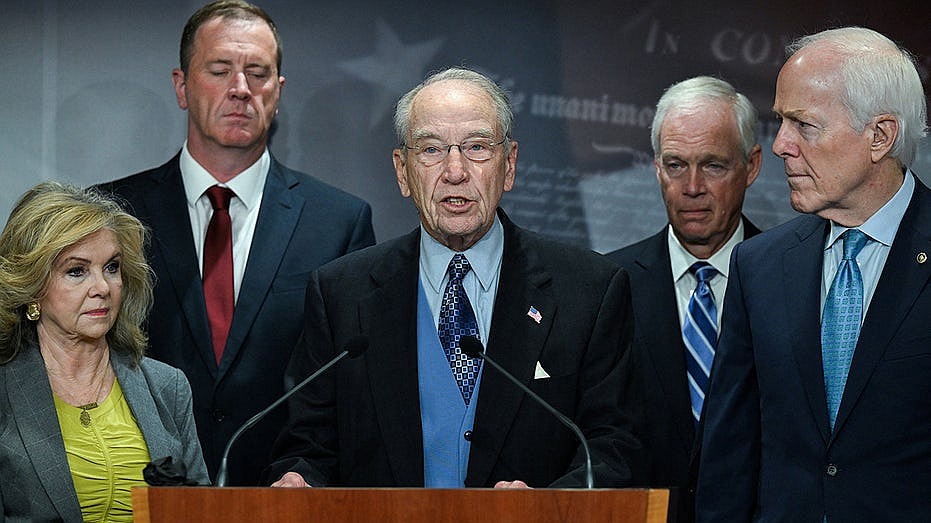Major phone carriers reveal Jack Smith’s subpoenas for Republican senators’ records
In a recent revelation, two major telecommunications companies, Verizon and AT&T, demonstrated markedly different responses to subpoenas issued by Special Counsel Jack Smith’s team as part of the Arctic Frost investigation, which is probing election-related charges against former President Donald Trump. The subpoenas, which were first disclosed by the office of Sen. Chuck Grassley (R-Iowa), sought phone records linked to several Republican lawmakers during a critical four-day period surrounding the January 6 Capitol riot. Notably, the subpoenas to Verizon included records for 12 phone numbers associated with lawmakers, including well-known figures such as Sen. Ted Cruz (R-Texas) and Sen. Rick Scott (R-Florida). In contrast, AT&T resisted compliance with the subpoenas, questioning the legal basis for the requests and ultimately not producing any records.
Verizon justified its compliance, asserting that the subpoenas were “facially valid” as they only requested phone numbers without identifying the individuals involved. The company has since indicated that it will adopt a more cautious approach to similar requests in the future, following discussions with the Senate Sergeant at Arms. Conversely, AT&T’s response highlighted its reluctance to comply, with General Counsel David Chorzempa noting that when they raised concerns with Smith’s office, the subpoenas were not pursued further. The contrasting approaches of the two companies have sparked significant debate among lawmakers, with many, including Grassley, expressing alarm over what they perceive as an overreach by the Biden administration. They argue that the subpoenas represent an “enemies list” and infringe upon the constitutional protections afforded to members of Congress.
The fallout from these subpoenas has ignited a fierce political discourse, with Republican senators likening the situation to the infamous Watergate scandal. They have raised constitutional objections, arguing that the subpoenas violate the speech and debate clause, which is designed to protect lawmakers from certain legal inquiries while they perform their legislative duties. In response, Smith defended the legality of the subpoenas, asserting that they were narrowly tailored and essential for the investigation. As the political ramifications unfold, Smith has sought to testify before Congress about his work, while lawmakers continue to grapple with the implications of these subpoenas on congressional oversight and the balance of power between the legislative and executive branches. This situation underscores the ongoing tensions within U.S. politics, particularly regarding the intersection of law enforcement and legislative immunity.
Related articles:
– Link 1
– Link 2
FIRST ON FOX:
Two major phone carriers took sharply different paths when former special counsel Jack Smith’s team subpoenaed phone records tied to Republican lawmakers in 2023, according to the redacted subpoenas and letters first shared with Fox News Digital.
The documents, provided by the office of Sen. Chuck Grassley, R-Iowa, reveal Verizon’s compliance and AT&T’s resistance when faced with Smith’s requests, which were part of Arctic Frost, the FBI probe that led to Smith bringing election charges against President
Donald Trump
.
The 12 phone numbers on the subpoena to Verizon are redacted and replaced by Grassley’s office with the names of the lawmakers associated with them. They include one House member and 10 senators, including Sen. Rick Scott, R-Fl., whose name was not previously reported.
AT&T received a similar request, according to a second subpoena. The company told Grassley the subpoenaed phone records were associated with two lawmakers, including Sen. Ted Cruz, R-Texas, according to a source directly familiar with the matter. The source said AT&T declined to disclose the second person.
REPUBLICANS CLAIM BIDEN ADMINISTRATION ‘ENEMIES LIST’ UNEARTHED FROM ARCTIC FROST INVESTIGATION
Accompanying the two subpoenas were gag orders, signed by U.S. District Judge James Boasberg of Washington, D.C., that directed the two phone companies not to disclose the subpoenas to the lawmakers for one year. Prosecutors can seek such gag orders to temporarily keep investigative matters confidential.
The phone companies also wrote letters to Grassley, first shared with Fox News Digital, explaining how they handled the subpoenas they received, revealing two different approaches.
Verizon justified complying with the subpoenas, saying they were “facially valid” and contained only phone numbers, not names. Verizon said that with the “benefit of hindsight” and recent discussions with the Senate Sergeant at Arms, which handles congressional phone services, it has modified its policies so that it puts up more of a challenge to law enforcement requests pertaining to Congress members.
AT&T, meanwhile, did not comply with the subpoenas.
“When AT&T raised questions with Special Counsel Smith’s office concerning the legal basis for seeking records of members of Congress, the Special Counsel did not pursue the subpoena further, and no records were produced,” David Chorzempa, general counsel for AT&T, wrote.
The release of copies of the subpoenas and new details from phone companies comes after
Grassley
published earlier this month a one-page FBI document indicating the existence of the subpoenas and naming most of the senators. They included Republican Sens. Marsha Blackburn, Josh Hawley, Lindsey Graham, Bill Hagerty, Dan Sullivan, Tommy Tuberville, Ron Johnson and Cynthia Lummis.
Cruz later revealed that he was in the mix, and Scott announced on Thursday that he too was a target.
Grassley said Wednesday that Smith’s subpoena to Verizon included Cruz’s office’s landline. In Verizon’s letter to Grassley, it noted that there were no records to give Smith pertaining to the landline request.
The two subpoenas to Verizon and AT&T sought toll records for a four-day period surrounding the Jan. 6 Capitol riot. They did not include the contents of phone calls or messages, which would require a warrant, but they did include “[call] detail records for inbound and outbound calls, text messages, direct connect, and voicemail messages” and phone number subscriber and payment information.
News of the subpoenas sparked an outcry from the senators, who claimed Smith improperly spied on them and that Arctic Frost was “worse” than the Watergate scandal. The lawmakers have raised numerous constitutional concerns, including claims that the subpoenas violated the speech and debate clause, which gives lawmakers an added layer of immunity from investigations.
JACK SMITH DEFENDS SUBPOENAING REPUBLICAN SENATORS’ PHONE RECORDS: ‘ENTIRELY PROPER’
Smith, in response, said in a
letter
through his lawyers that he mentioned subpoenaing senators’ phone records in his public, final special counsel report and that the subpoenas were narrowly tailored to the four-day period and “entirely proper.”
Smith has asked House and Senate lawmakers to allow him to testify before them in a public hearing to speak about his special counsel work. House Judiciary Committee Chairman Jim Jordan, R-Ohio, however, wants to question Smith behind closed doors and Grassley has said he needs more information before he hosts Smith in a public setting.
The DOJ has issued subpoenas for lawmakers’ information in the past, but former inspector general
Michael Horowitz
cautioned against it except in limited circumstances in a report published last year, saying that doing so “risks chilling Congress’s ability to conduct oversight of the executive branch.”
Horowitz’s warning came in response to the first Trump administration subpoenaing phone records of Rep. Eric Swalwell, D-Calif., and then-Rep. Adam Schiff, D-Calif., and dozens of congressional staffers from both parties as part of an investigation into classified information being leaked to the media.
Despite enjoying additional constitutional protections, members of
Congress
can still be investigated and prosecuted. Former Democratic Sen. Bob Menendez’s phone records were seized while he was serving in office. Menendez is now serving in prison after being found guilty by a jury last year of corruption charges.
Eric
Eric is a seasoned journalist covering US Politics news.



